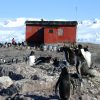Scientists, policy makers and the general public will gather at Eckerd College next month for the first Eckerd College Food Security Conference to discuss GMOs, growing grains for food not biofuels and how to feed a global population that will double in the next 35 years.
The aim of the conference on April 24 and 25 is to help shape public policy about food that is grounded in science.
How will we feed the world’s growing population? Are GMOs an answer? Should we grow grains for food or fuel?
The conference, to be held in the round at Wireman Chapel on the Eckerd campus, will be divided into two distinct parts.
The first day will be devoted to presentations by three internationally recognized scientists and industry experts, who will then be questioned by a panel of fellow scientists, academics, policy makers and students. The audience will participate through written questions.
The second day will be devoted to small-group sessions involving panelists and audience members to draft ways policy makers can turn ideas into action.
Summaries of the ideas, debates and papers will be compiled by Eckerd students and presented to policy makers.
The conference is free and open to the public, but registration is required.
The conference is sponsored by Eckerd College, the Institute on Science for Global Policy and Sigma Xi, the scientific research society.
“Eckerd is proud to host this important conference, which will bring together experts and concerned citizens in a collegial atmosphere ,” said Dean of Faculty Suzan Harrison, Ph.D. “The future of our planet depends on developing sustainable solutions to feeding the world.”
The presenters and the topics they will discuss are:
Alison L. Van Eenennaam, Ph.D., cooperative extension specialist in animal genomics and biotechnology at the University of California, Davis. She received a bachelor’s degree in agricultural science from the University of Melbourne in Australia, and both a master’s degree in animal science, and a doctorate in genetics from UC Davis. She will discuss lessening regulations of plant and animal GMOs to lower the cost of feeding a growing planet.
Rachel Goldstein, Global Sustainability Manager, Scientific and Regulatory Affairs, Mars Inc. She has an MBA with an environmental management concentration from The George Washington University, and a bachelor’s degree in human factors engineering from Tufts University. She will discuss the challenges of feeding an exploding world population through sustainable means from an industry perspective, including reducing food waste.
Lee R. Dehaan, Ph.D., plant geneticist at the Land Institute in Salina, Kan. He has a bachelor’s degree in plant science and biology at Dordt College and a master’s degree and doctorate in agronomy, specializing in agro-ecology, from the University of Minnesota. He will discuss shifting the use of perennial grain crops away from biofuels and animal feed to production of food for the growing world population.
All three scientific papers will be available online before the conference starts to allow participants to study them and prepare questions.
Visit eckerd.edu/food more information about the conference including the daily schedule and registration.












